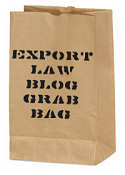 An indictment was returned on October 28, charging three men with conspiring to export carbon-fiber material to the China Academy of Space Technology (“CAST”). Certain types of carbon-fiber materials are covered by ECCNs 1A002, 1C010, 1C210, and 1C990. The DOJ press release announcing the indictment provides no further detail on the carbon-fiber material involved or the applicable ECCN.
An indictment was returned on October 28, charging three men with conspiring to export carbon-fiber material to the China Academy of Space Technology (“CAST”). Certain types of carbon-fiber materials are covered by ECCNs 1A002, 1C010, 1C210, and 1C990. The DOJ press release announcing the indictment provides no further detail on the carbon-fiber material involved or the applicable ECCN.
Two of the indicted men are or were employed by a Singaporean import/export company known as FirmSpace, Pte Ltd. A reporter for Singapore-based news website TODAYonline visited FirmSpace and discovered some interesting things:
For over a year, the company, Firmspace …, appears to have not had any business. But it has not laid off any employees and was even able to pay its staff promptly, said its receptionist, who only wanted to be known as Ms Vera.
“I found it quite strange but I never thought of asking the bosses, as long as I still got my salary,†she told Today. …
None of the three employees working in Firmspace knew what was sustaining the business, Ms Vera said. But she stated that Firmspace had been “involved in a few projects†— she didn’t know the nature of these projects, though — since it stopped its import and export business, but none of them were successful.
Ms. Vera and her two co-workers had the perfect job where they got to show up at work, do absolutely nothing at all, and still get paid. Who were they to step off this gravy train?
Of course, it doesn’t take an especially clever sleuth to guess what was going on:
TODAY’s checks revealed that Chinese nationals Mr Hou Xinlu and Mr Gao Xiang are listed as Firmspace’s directors. It is believed they are based in China.
Ya think?
Not surprisingly, Firmspace appears to be simply a front company set up by CAST or some other agency of the Chinese government to obfuscate Chinese efforts to obtain export-controlled items from the United States. This time it didn’t work out so well, since the Chinese front company tried to order the carbon-fiber material from a U.S. front company set up by the U.S. government to catch people trying to engage in illegal exports. Still, you have to wonder how many people get paid by the Chinese to sit at desk in a front companies used by the Chinese in their attempts to obtain sensitive materials from the United States and other countries.

 Posted by
Posted by  Category:
Category: 

 The Office of Antiboycott Compliance of the Bureau of Industry and Security (“BIS”) released a
The Office of Antiboycott Compliance of the Bureau of Industry and Security (“BIS”) released a 
 Some interesting news today on the sanctions front, so it’s time for another Export Law Blog grab bag:
Some interesting news today on the sanctions front, so it’s time for another Export Law Blog grab bag: The Office of Foreign Assets Control (“OFAC”) today
The Office of Foreign Assets Control (“OFAC”) today 

